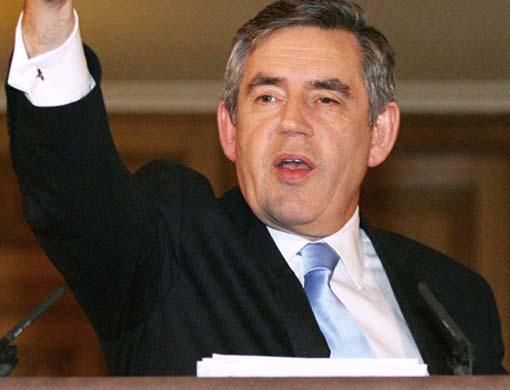London: Britain's Prime Minister Gordon Brown yesterday defended his decision not to call an early general election, rejecting criticism that it showed he was weak and indecisive.
Opponents have derided Brown, accusing him of stoking speculation of an early vote only to lose his nerve in the face of opinion polls showing the opposition Conservatives overcoming a big deficit or even in front of the ruling Labour Party.
"Real strength and real decisiveness is making the long-term decisions about the future of your economy and ... about the future of your security and defence," Brown told a news conference, dominated by questions about his decision.
Political commentators said Brown, who initially impressed voters after taking over from Tony Blair in June, had scored a spectacular own goal, giving a boost to Conservative leader David Cameron.
Doubts revived
The episode revived doubts about the character and decisiveness of the brooding Brown, famous for his mighty intellect but also for being paralysed by caution at key moments.
Brown said his decision at the weekend was not influenced by the polls and that he would have abandoned plans for an election even if Labour had been in the lead. Brown said he would not blame his aides. "I take full responsibility for everything that has happened," he said.
He conceded he could have taken a decision on an election sooner. "Perhaps I should have made it earlier," he said. "Your weekend has been better than mine," he ruefully told reporters, acknowledging he had had a tough weekend.
Brown, keen to secure his own mandate after Blair's three election victories, had brought forward key announcements to pave the way for a possible election in November. He does not have to call an election until 2010.
He infuriated the Conservatives by visiting British forces in Iraq last week, stealing the limelight from the Conservatives' annual conference.
Conservative leader David Cameron accused Brown on Sunday of treating the British people like fools. "Everybody knows he's not having an election because he's afraid of losing it."
Brown said he believed the government would have won an election but he wanted more time to set out his vision for the country.
"I think he will now be known, as he has been privately for a very long time, as a man who finds it very, very difficult to make up his mind on the really tough decisions, especially when they come out of the blue," said Trevor Kavanagh, associate editor of the Sun newspaper.
New policy
Help assured for
Iraqi local staff
British Prime Minister Gordon Brown confirmed yesterday that London will help Iraqi local staff who have worked for British forces to settle in Iraq and elsewhere, including Britain under agreed circumstances.
Local staff including interpreters and translators who have worked for Britain for 12 months or more will be eligible for financial and other support, he said in a long-awaited statement to lawmakers.
"I am pleased to announce today a new policy which more fully recognises the contribution made by our local Iraqi staff who work for our armed forces and civilian missions in uniquely difficult circumstances.
"Existing staff who have been employed by us for more than 12 months and have completed their work will be able to apply for a package of financial payments to aid resettlement elsewhere in Iraq or elsewhere in the region or - in agreed circumstances - for admission to the UK."
Earlier Brown said the withdrawal of British troops from Iraq was not a sign of failure, but a decision based on the Iraqis' capacity to run their own security.
- AFP













